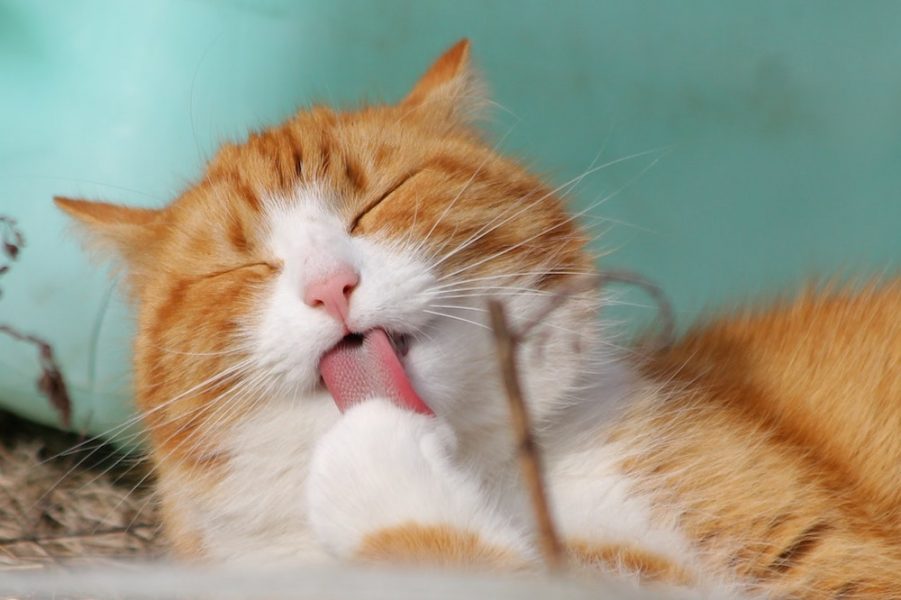Anyone who has ever had an allergy knows they can make life miserable, and our feline companions are no different. Therefore, it is important to recognise the symptoms of your cat’s specific allergy so that you can take the appropriate steps to eliminate the allergen, or at least alleviate their symptoms. There is a wide range of allergens that can cause allergies in cats, but they can be divided into four categories.
Flea allergies

Flea allergies are very common in cats. While a normal cat experiences little to no discomfort from a flea bite, a cat that is allergic to fleas will have a severe reaction caused by a single flea bite. The main symptom of a flea allergy is intense itching which will likely cause your cat to scratch and bite the affected area to such an extent that it will lead to hair loss, sores and scabs on the skin, usually on the base of the tail, belly, flanks, head and neck. If you notice these symptoms, the first order of business is to eliminate the fleas from the cat itself and from your home. The best way to do that is to use flea control medication that kills adult fleas but also contains an insect growth regulator (IGR) that prevents newly hatched fleas from growing and reproducing. Once the fleas are gone, your cat may need injections of corticosteroids to soothe the allergic reaction and stop further intense scratching.
Food allergies

Food allergies, or more specifically, allergies caused by certain ingredients that can be found in cat food, can develop over time if your cat’s diet has remained the same for many years. The main symptoms are intestinal problems such as vomiting and diarrhea as well as itching and frequent skin or ear infections. The easiest way to see if your cat is allergic to any type of food currently in its diet is to drastically change your cat’s diet for 8 to 12 weeks so all remaining potential allergens can leave the cat’s system. If the symptoms disappear, then the cat was allergic to something in its previous diet. You can then either stick with the different diet or systematically reintroduce each individual component of the previous diet to discover the culprit. Sometimes it’s not the food itself that is causing the allergic reaction but an additive in the food is the issue, so it’s best to use additive-free natural cat food. After all, as all cat owners can testify, the cat, not the human, is the boss of the house, which means it deserves only the best.
Inhalant allergies

Inhalants are the most common form of cat allergens and they include various types of pollen, dust mites, molds, mildew and even some perfumes. While humans suffering from this type of allergy display respiratory symptoms, also known as hay fever, cats experience generalized severe itching. Depending on the type of inhalant, these allergies may be seasonal (pollen) or they can last all year round (household allergens). The best way to determine what your cat may be allergic to is to ask your veterinarian to perform a skin or blood test. There are various ways to deal with these types of allergies, but the best starting point is limiting exposure. If your cat is allergic to pollen, keep it indoors during the problematic time period, and if it’s allergic to indoor allergens make sure to clean your home often and thoroughly, and avoid scented pet products. If the symptoms become more severe, the vet might prescribe some fatty acid supplements or antihistamines to ease them.
Contact allergies

Contact allergies, such as the ones caused by wool bedding, flea collars or plastic food bowls, are by far the least common category and result in local skin irritation. With some research, it shouldn’t be too difficult to find the problematic item and remove it, which will eliminate your cat’s symptoms.
All in all, it’s important to pay attention to your cat’s food labels, to choose the flea treatments carefully and to limit your cat’s exposure to allergens. Hopefully, this has given you some insight into what allergies may be bothering your cat and how to deal with them, but since these symptoms are not specific to allergies, we recommend that you visit your vet if you notice that your cat is suffering from any health problems. After all, they are trained professionals and will always know how to make your favorite fur ball healthy again, so it can go back to its usual happy routine of playing, purring, sleeping and knocking things off tables.






